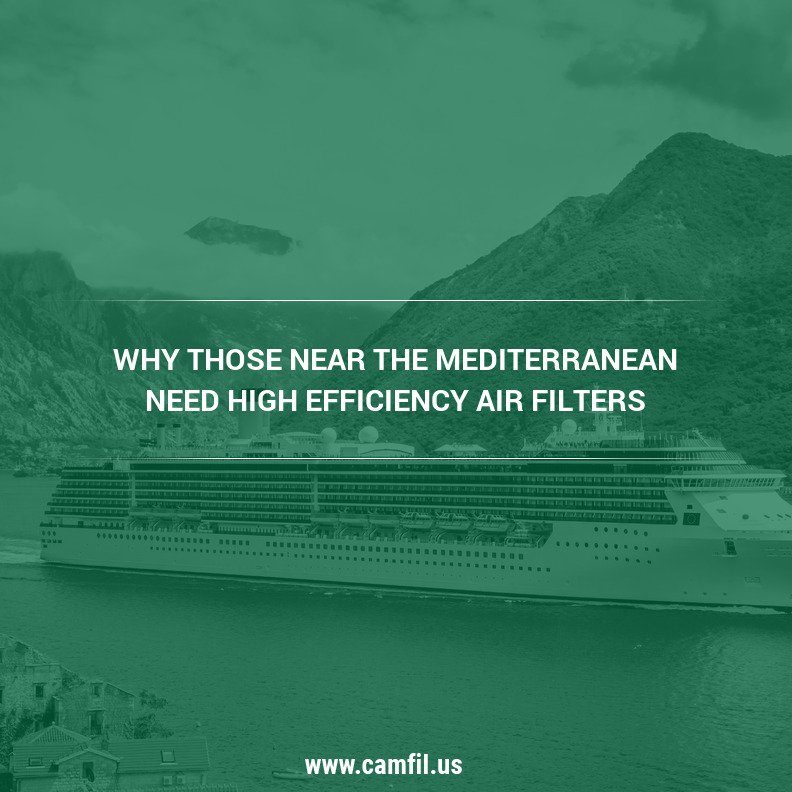Clean Air Solutions – With the Mediterranean Sea being one of the busiest waterways in the world, it should come as no surprise that all of this traffic has contributed to a serious air pollution problem in the region, forcing coastal towns to install air filters.
And to add to the list of reasons to address what is increasingly becoming a serious public health problem, a recent report that proposes creating a low emission zone for ships, also known as a emissions control area (ECA), in the region has found that improving air quality in the Mediterranean would not only save lives, it would also save money.
Specifically, the feasibility report concluded that the financial gain from cleaning up the region’s air pollution would outweigh the effort’s costs threefold. The push to create a low emission zone in the Mediterranean has so far received the support of France, Spain, Italy, and Morocco, while Malta and Greece opposed the measure.
What’s Affecting Outdoor and Indoor Air Quality in the Region?
It’s simple really. Many of the ships that ply the Mediterranean use dirty fuels, such as bunker fuel, which contain high concentrations of sulfur and release toxic emissions of sulfur dioxide (SO2), particulate matter, and black carbon when burned. These pollutants enter buildings and homes, affecting indoor air quality as a result.
“Combustion generates H2O, NO, NO2, CO, CO2 and particulate [matter]. Combustion can also emit hydrocarbon gases, vapors, and organic particles,” said Camfil USA’s Charlie Seyffer, Manager of Marketing & Technical Materials for commercial air filters and 37-year ASHRAE member and active committee participant. “Impurities such as metals, mercaptans, sulfur oxides, and other particles can be emitted.”
Indeed, as much as 40 percent of the air pollution detected in coastal towns around the Mediterranean can be traced back to the shipping industry. But it’s not just tankers and cargo ships that are causing the problem. As one of the world’s fastest-growing cruise ship destinations, the Mediterranean sees many cruise ships visiting the region. Unfortunately, many of these cruise ships also use heavy fuel and burn them even when they are in port to keep the generators running.
Feasibility Report Highlights Importance of Air Purifiers and Air Filtration
The feasibility report, commissioned by the French environment ministry, also added that air pollution, specifically particulate matter pollution, produced by the shipping industry accounts for 6000 premature deaths around the Mediterranean each year and is quickly showing signs of becoming a public health crisis, which may soon require homes and buildings in coastal towns to be outfitted with home air purifiers.
The researcher’s authors also noted that establishing an ECA in the region would save $9 billion to $15 billion a year. The cost of creating this zone, however, would be less than $4 billion. These benefits would also be maximized if the proposed ECA’s rules would also apply to nitrogen oxide (NOX), but this may place too heavy a burden on shipping companies as it requires newer, more expensive engines.
Continued Use of Dirty Fuel Could Lead to Increased Demand for Air Filtration Systems
Globally, it’s estimated that air pollution from the shipping industry is responsible for at least 60,000 premature deaths, highlighting just how important it is for homes in coastal cities to have air filtration systems.
The good news is that governments are taking notice, which is why the International Maritime Organization (IMO) has enacted a 0.5 percent sulfur cap on shipping fuel by 2020. In the EU, on the other hand, ships are already required to use fuel with a sulfur content of less than 0.1 percent. Either way, both standards are a significant reduction from the current standard of 3.5 percent and well below the industry average of 2.7 percent sulfur content.
According to projections by public health groups, the sulfur cap on shipping fuel should prevent around 150,000 premature deaths around the world and 7.6 million cases of childhood asthma each year.
PM Pollution from Ships Requires Installation of HEPA Filtration Systems
Ships also produce particulate matter (PM), a type of pollutant that consists of microscopic particles that are smaller than 10 microns in diameter. While some of these particles are large enough to settle to the ground, the majority of PM stays airborne after being released by emissions, increasing their likelihood of being inhaled. When this happens, PM can damage the heart and lungs. Fortunately, modern high efficiency filtration systems are capable of capturing 99 percent of airborne particulate matter.
Get Home Air Purification Systems from a Trusted Manufacturer
With more than 50 years of industry experience, Camfil USA is a trusted provider of air filters and air purification systems for both PM and gaseous pollutants. To learn more about how air filtration systems and high efficiency air filters can protect indoor air quality, get in touch with Camfil USA today.
Lynne Laake
T: 888.599.6620
E: Lynne.Laake@camfil.com
Y: Watch Camfil Videos on YouTube
F: Friend Camfil USA on Facebook
The post Why Those Near the Mediterranean Need High Efficiency Air Filters appeared first on Air Filters for Clean Air.

